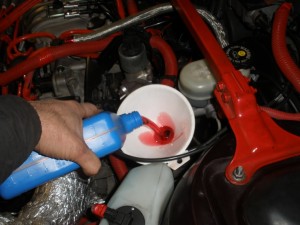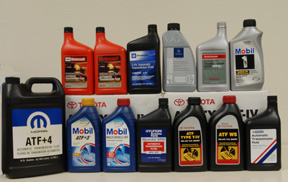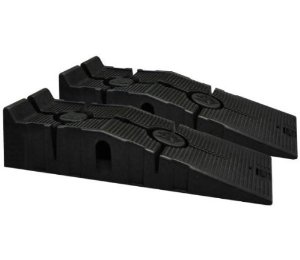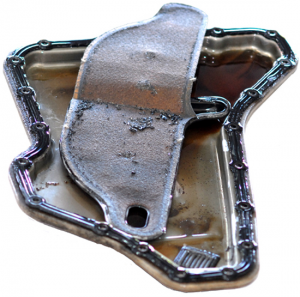A do-it-yourself transmission fluid change is an affordable way to maintain and lengthen your vehicle’s performance and lifetime and it will save you from waiting at a service station and listening to a mechanic try to sell you additional services that your doesn’t need.
What Transmission Do I Have?

To avoid transmission problems, you should check the level and condition approximately once a month using the dipstick. If the color is bright red and it smells sweet, it is still usable, but if it is darker, dirty and/or smells burnt, change it. If the level is low, top it up and check for leaks.
In This Guide
When to Change Transmission Fluid
It is often recommended that you change the fluid in your car every 30,000 to 60,000 miles (see your owner’s manual for the specific advised maintenance schedule).
The frequency should change depending on how tough you are on your transmission and how severe the conditions you drive in are. Tougher conditions include trailer towing, extended high speed driving and driving in cold weather require more frequent changes (every 15,000-24,000 miles give or take).
For automatic transmissions, some manufacturers recommend that the fluid be only changed every 60,000 to 100,000 miles. To tell how hard you’re being on your gearbox, you can install a temperature gauge.
How Much Does it Cost?
 The cost of having your fluid changed at a dealer, service center or independent mechanic ranges from $80-$250. The average is around $100.
The cost of having your fluid changed at a dealer, service center or independent mechanic ranges from $80-$250. The average is around $100.
A do it yourself oil change typically cuts the price in half (at least), and it’s as easy as following a few simple steps as outlined below. To change the fluid yourself, it will cost around $40 to $90 for the filter, gasket and the most important component – the transmission oil. This estimate does not include the cost of the tools required to do the job.
Note: A transmission flush is a different process and typically costs around twice as much as a change.
How to Check
To check to see if your vehicle needs an oil change, simply:
- Turn on your car and let it run a few moments (It is always best to check your oil when it has had time to warm up).
- Wipe the dipstick with a clean cloth or rag; then put it back in and take it out again.
- If the oil is clear but at the low mark, pour in enough fluid to bring it up to the appropriate level. Don’t overfill!
- If the fluid is very dark or smells burnt, it need to be changed. Good clean oil should be bright red/pink in color.

Tools You Will Need
- Fluid – Check your vehicle’s owner’s manual to tell you how many quarts, and the specific type you will need, or speak to a representative at the auto parts store.
- Filter – Check to make sure you get the correct size and quality.
- Torque Wrench – If you don’t have one, don’t fret. A normal socket wrench set will suit you just fine.
- Large pan to catch the fluid – you don’t want to get it on the ground or in the dirt. Try to get one that is larger than the pan (casing) as it will leak out from all sides.
Instructions
Put Your Car on Ramps
 Start by putting your car up on ramps, or jacking up the front part of your vehicle, while using jackstands. Don’t forget to block the wheels. Put old clothes on, this will get kind of messy. You may also want to put newspaper underneath where you will be working so no oil will get on your driveway. It is also very important to dispose of it properly once you are finished. Many auto parts stores either have a place where you can dump the oil, or can tell you how to dispose of it properly. It is not recommended that you empty it in your trash or in your yard.
Start by putting your car up on ramps, or jacking up the front part of your vehicle, while using jackstands. Don’t forget to block the wheels. Put old clothes on, this will get kind of messy. You may also want to put newspaper underneath where you will be working so no oil will get on your driveway. It is also very important to dispose of it properly once you are finished. Many auto parts stores either have a place where you can dump the oil, or can tell you how to dispose of it properly. It is not recommended that you empty it in your trash or in your yard.
Find the Transmission Pan
Locate the transmission pan with the help of your owners manual. Put the oil pan that you will use directly underneath. Remove the bolts slowly and keep your face out of the way. Once the seal is broke on the bolts, the fluid will start dripping out. Put the bolts to the side and let the oil drain completely into the drain pan. Wash the sediments and deposits out of the pan using fluid, not water. Inspect the debris that was in the pan. Doing so can help you determine whether the transmission is running properly or if there is a impending problem in the near future. This can be difficult for the untrained eye to do, so in the words of an ASE Certified Master Automotive Technician (CMAT): “You should see next to no filings or debris, and then only on the first change, subsequent changes should be nearly dead clean. If your car is relatively new and you find debris, there is a problem. You might find just a trace of aluminum shavings, or other very minor contaminants, but the assembly process is so clean, and the newer gearboxes so unforgiving of dirt, that any real accumulation generally means a problem is in development.”

Check the Gasket
Check to see if you need to replace the gasket. If it is well worn, go ahead and replace it. It will save you repair further down the road. Apply a thin layer of RTV sealant to the pan’s flange to ensure a nice tight, leak proof seal.
Remove the Filter
Once it has drained completely, remove the filter. Take caution, the filter has fluid in it as well. Replace it with your new filter, and tighten to the specifications in your owners manual. Then replace the bolts on the pan, tighten them for the first couple threads by hand before using a tool. Now you are ready to add the fresh oil. A funnel is recommended, hardly anyone can do this without spilling.
What Transmission Do I Have?

Once you have completed your oil change, start the car up and let it run a few minutes. Shift your gears a few times, then put in back in park. Now you can check the dipstick. Pull the dipstick out, wipe it on a clean rag, reinsert it, and pull it out again. Hold it level and check to see where the oil is sitting on the stick. It should be sitting on the correct line, usually saying full. Once this is complete, you are ready to take it off the ramps, or let it down from the jack. Then give yourself a pat on the back. You just changed your own fluid and saved money!

2009 Altima transmission hum when car is running fast, also.the RPM gage doesn’t move very much no matter what speed and there is a smell when.car first start moving
It went into limp mode and then it just a stop shut off and it won’t go in gear
My 03 explorer xlt has no dip stick how to check the tranny fluids beside take to mechanic an how to do a change at home please help????
Have a 2010 crown vic police interceptor. Transmission mission slips when hits 25miles per hr then 40 it studders i have fluid
I just changed my tranny fluid and filter on my 2002 doge dakota v 6 and now it’ll start up just fine and run until it gets warmed up and then it just won’t shift at all like it’s in neutral what do I do
Slips once in a while especially when cold, seems like if you let off gas and then gas it again it reengages
Sorry guys, should have included that this is a 2007 Mazda 3 with a 2.0L that’s having the issue.
Your trans search tool is missing the GM 10L80 10-speed and the Ford 10-speed variant as well. Trans is in Tahoe 6.2L, Silverado 6.2L, Escalade, GMC Yukon, Mustang GT and Explorer to name a few applications.
Your trans search does NOT include the 10L80 10-speed in the 2018 Tahoe RST with the 6.2L V8. It is also in the Silverado, Camaro & Escalade as well as various Ford s like the Mustang GT and Explorer. Needs updating.
I purchased a used truck. 2004 Dodge Dakota. It has a code for transmission shift solenoid I took it to the transmission place and they rebuilt the transmission and didn’t change the solenoid is that normal?
I have lost my AT mode and my transmission is stuck in a gear. I have reverse and can drive it at any speed but it’s not shifting. 2000 mitsubishi Montero sport 3.0 at the same time all that happened I lost my cruise control a n my SRS light is on Help
One day it just quit. Changed the fluid new filter and new gasket. Drove fine. Next day drove fine on highway 70rpms. And then i hear slipping. Now it wont go. Put it in1 and nothing. Fluid is clear and full. Help Is it out?
there is no dip stick in a 2011 cruze, just a level pug
been sitting for a while and does not shift right
some gears it does not get at all
2005 navigator
Location to add transmission fluid, without bringing it to a shop.
If you can provide a picture to point out the location.
How do you get a level reading with a car still on the ramps or on jack stands?
Well, if you’re just trying to get a fluid level reading prior to changing the transmission fluid, do it before you put it on the ramps. If you want to get a level reading AFTER draining the fluid and or cleaning the pan, take the car off the ramps before refilling. That’s all you gotta do.
How are you supposed to put it into reverse and lower off ramps and change gears with no fluid back into yet?
I have a 2012 Ford Explorer. Is it necessary To do the flush every time i do the the transmission fluid change?
My ford excape loses power and smells burnt do I need a new transmission?
Yes
after draining ATF completely, when its time to refill, should the engine be off or on because there is absolutely no ATF within the gearbox?
It would be best to consult the procedure for your specific transmission but usually you add half of the fluid, start the car (keep in P), add the other half called for then cycle through the gears and check the dipstick. Try to measure exactly how much you drained. It is far easier to add a little more than get under the car and drain excess.
Did anyone answer u on this I need to kno to
Hello I have a 2012 Honda Accord, I want to do a transmission drain and fill. How many quarts would I need to replace my old transmission fluid?
Check your owners manual
ATF hot level should be checked at operating temperature , idling and parked which can be difficult due to the high heat of the CAT on some vehicles.
How do you get an accurate ATF level when the front is lifted on ramps?
The last paragraph states “Once this is complete, you are ready to take it off the ramps, or let it down from the jack.”
I see this is older thread, but found myself wondering same thing. Also, shifting gears while on the ramp…. envisioned many disastrous outcomes with an amateur DIY mechanic. Overall Good tutorial, and thanks .
A good safe mechanic wwould also have emergency (parking) brake on
It’s as much about the car being level as well as safety. Either way I recommend chocks for the rear wheels, emergency brake and using jack stands to raise the car. Once the filter and pan have been replaced lower the car and then go through the filling procedure. Otherwise you are measuring fluid levels at a slanted angle meaning overfill/underfill.
2001 suzuki swift won’t stay in 4th gear.
Should not have bought a Suzuki…